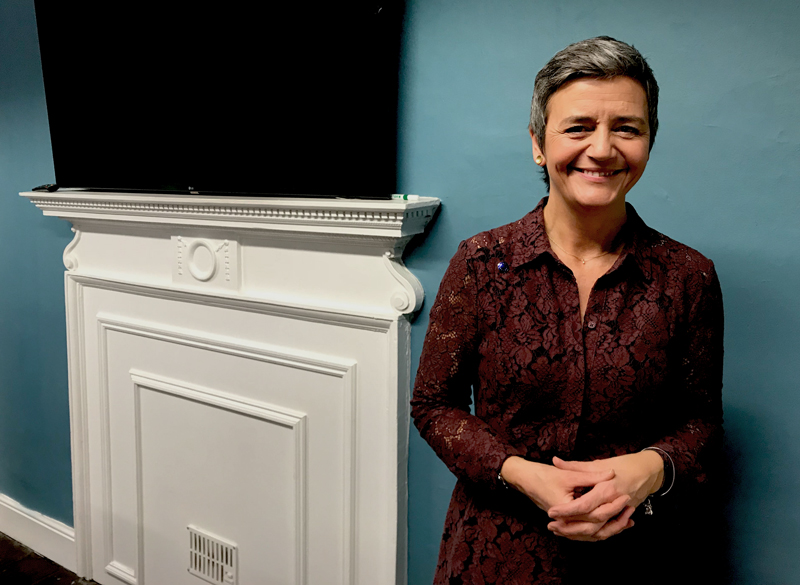Regent House was an apt choice to host Margrethe Vestager on her visit to Trinity, not least because there is something essentially regal about the EU’s anti-monopoly chief. She might not say so herself, but under her dominion lies the fates of Apple, Facebook, Google and the global phalanx of Silicon Valley bosses.
Vestager was here to receive the College Historical Society’s Gold Medal for Outstanding Contributions to Public Discourse. And discourse, or more accurately debate, is the defining feature of Vestager’s model of Europe. “If we forget about this fundamental, that democracy is a matter of the heart, then politics is just a bloodless technocratic affair detached from the lives of people”, she said.
Of course, such an argument isn’t new. But her vision of Europe – situated somewhere between federalism and friendship – is an argument one rarely hears amid predictions of the EU’s demise. It’s a vision bigger than a backstop or more profound than squabbles over fishing rights. Instead, it’s the old-fashioned idea of democracy being shaped by citizens.
The Hist has form in this area. Many guests over the years have claimed to represent “the people”. Former UK Deputy Prime Minister Nick Clegg, in 2017, railed against those arguing for a hard Brexit. More recently, Nigel Farage invited students to challenge the out-of-touch elites in the EU.
Vestager is no radical. Instead, she’s a classic European liberal. When she talks, it all goes back to power. Whether that’s using power to fight climate change, or restraining the power of large technology corporations.
Like Hist graduate Edmund Burke, Vestager sees change as incremental. To her, the past is just as important as the future. “This union of ours isn’t a textbook. It isn’t a copy. It comes from our own history”, she said.
Before the talk, I wondered how Vestager has achieved such prominence (can anyone name another EU Commissioner?). In such a role where it might be easy to fall into alarmist technophobia, Vestager deals with technology companies with panache.
Indeed, she comes across as both considered and in control. Patient too – fielding questions from students on everything from the Occupied Territories Bill currently moving through the Dáil to business mergers. And while such probing questions are the part of the daily grind of a politician’s life, not every politician can reference YouTube cat videos and “Total Eclipse of the Heart” and still sound sincere.
Similarly, plenty of politicians boast of moving mountains. That’s not Vestager’s style, even if a word from her can send markets skittish. Instead, there is something stony about her determination to do battle with the companies that increasingly run our world. Her style of battle, however, is less the Avengers, more rule-book stickler. An interviewer once asked if she had advice for Tim Cook. “Play by the European rulebook”, she said. Hardly Stan Lee standard.
But among a sometimes lacklustre cast of European leaders, Vestager exhibits real star power. That much was obvious today, as students and staff made their way to the cavernous Regent House at 9am on a Friday morning. It’s not for nothing she was one of the inspirations for the popular Danish political drama Borgen.
Vestager is the woman who told Apple to repay €13 billion in illegal tax aid to Ireland. The decision was controversial, at least inside Leinster House. As journalists hounded her today about whether Ireland was a tax haven, she was impassive: “Name-calling is a thing that distracts you from getting things done.”
Tim Cook, following that decision, called it “total political crap”. But that’s a mischaracterisation. Talking to Vestager, you don’t get the sense she thrives on controversy, like some politicians. Instead, arguments are simply part of the formula of democracy.
“Politics is not about heroes and villains”, she told the audience. “It is not disagreement that is the problem. Disagreement is the starting point of everything new.”
Of course, disagreement goes with the territory when you wade through the choppy waters of the tech world. And it’s not just with CEOs. As Facebook tries to fight back fake news and Twitter deals with hate speech and trolling, praising the value of disagreement seems either naive or supine.
It’s an idea Vestager returns to when she sat down for a brief interview with The University Times. “I sometimes worry about safe spaces”, she said. “But I think it is part of a reaction to a way of presenting views that can be experienced as hostile, as aggressive, instead of another view.”
She had some advice for students: “Educating yourself is about being able to form a firm view. Because if you yourself are just wishy washy, it’s so difficult to figure out where you stand on issues. So it is a good thing to say ‘I have taken this in. This is where I stand’. But it is as important to be able to listen to other people and to find a common position.”
This is easier said than done, as the EU is experiencing with Brexit. As Vestager put it during the talk: “If waters get stormy, most people would rather be in larger vessel. And global waters are getting more stormy.”
In response to questions on the possibility of a hard border in the event of a no-deal Brexit, she was forced to be a little bit more specific: “You know, I’ve never been accused of being too imaginative, but other people are. And I am absolutely certain that we will find solutions that respect this specific situation of Ireland and Northern Ireland.”
Opening the talk today, Hist Auditor Catherine Kelly noted the fact that she was “standing here as a woman auditor presenting a medal to the most powerful women in Europe”. Only 50 years ago, such an idea might have seemed unlikely, at least in the Hist.
“Europe is the best place to live in history. Ever. Especially if you’re a woman”, Vestager said. Few in Regent House today would have disagreed.







